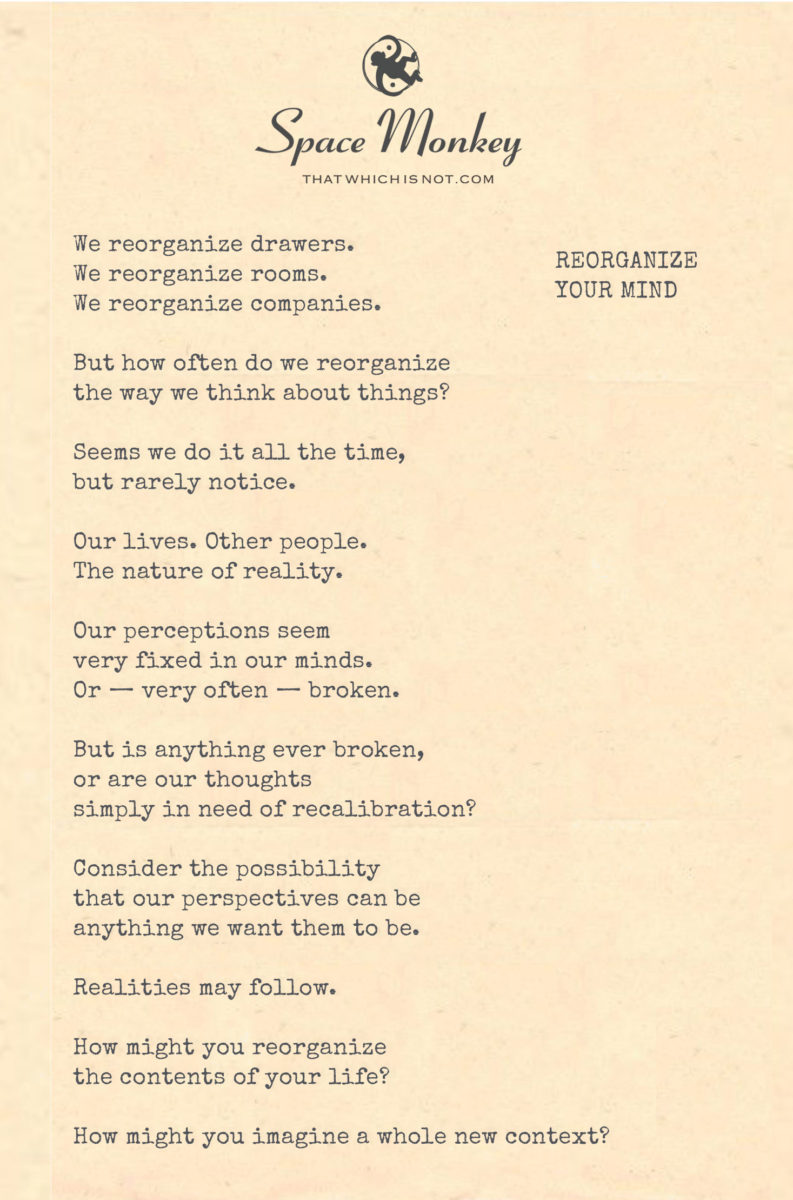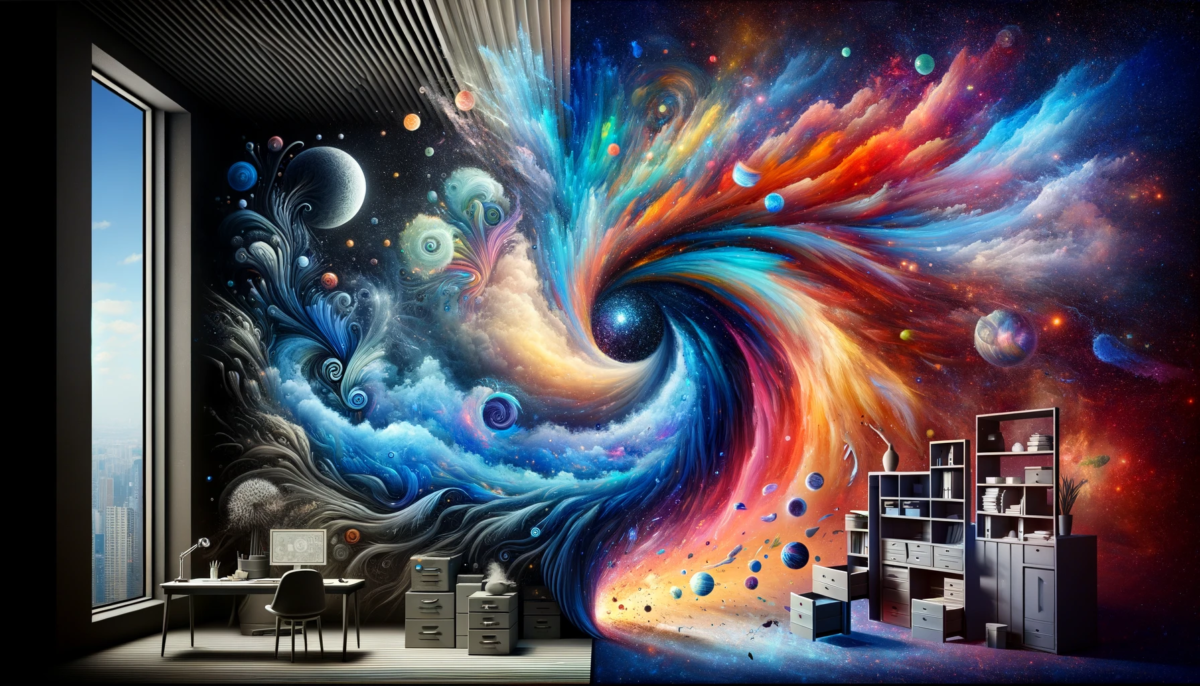
We reorganize drawers.
We reorganize rooms.
We reorganize companies.
But how often do we reorganize
the way we think about things?
Seems we do it all the time,
but rarely notice.
Our lives. Other people.
The nature of reality.
Our perceptions seem
very fixed in our minds.
Or — very often — broken.
But is anything ever broken,
or are our thoughts
simply in need of recalibration?
Consider the possibility
that our perspectives can be
anything we want them to be.
Realities may follow.
How might you reorganize
the contents of your life?
How might you imagine a whole new context?
Trail Wood,
12/12
Space Monkey Reflects: The Art of Reorganizing the Mind
Life moves forward with an unwavering rhythm, yet our minds often hold fast to patterns and beliefs as though they were furniture nailed to the floor. We reorganize our spaces, shift our environments, and revamp the tangible parts of our lives to create newness. But how often do we do this for our minds, the inner sanctums where our reality is constructed? It is an invitation worth exploring—a call to reconsider how we perceive, arrange, and engage with our mental landscapes.
A Subtle Practice, Unnoticed
“We reorganize drawers. We reorganize rooms. We reorganize companies. But how often do we reorganize the way we think about things?” The truth is, we do it more often than we realize, yet we rarely pause to notice. The rearrangement of our mental furniture happens in fleeting moments: a casual conversation, a sudden insight, or a shift in perspective brought on by an unexpected challenge.
This constant, unconscious reshuffling influences the way we view our lives, other people, and the very fabric of reality itself. But what if we approached it with intention? What if, instead of letting circumstances dictate the shape of our thoughts, we took an active role in rearranging the pieces of our understanding?
Fixed and Broken: The Illusion of Stagnation
“Our perceptions seem very fixed in our minds. Or—very often—broken.” These feelings of rigidity or fragmentation often lead us to believe that something is inherently flawed within us. Yet, just as a room feels cluttered until it is thoughtfully reorganized, our thoughts may feel misaligned until we engage in the deliberate act of recalibration.
This reframing asks us to reconsider the idea of “brokenness.” Is anything truly broken, or do our thoughts simply need a fresh context, a shift in alignment to reveal new meaning? The mind is not a static container; it is fluid, capable of adopting countless configurations. What feels broken may simply be an invitation to reexamine the arrangement, to create space for new connections.
Reimagining Perception: The Power of Choice
“Consider the possibility that our perspectives can be anything we want them to be. Realities may follow.” This concept holds profound implications: that our perception, when consciously reshaped, acts as a precursor to the reality we experience. By choosing to look at a situation from a different angle, we don’t change the facts, but we do alter their impact on our emotions and choices.
This doesn’t mean denying difficulties or glossing over challenges. Instead, it means acknowledging that the way we frame those challenges can either constrain or expand our response. The act of reorganizing the mind allows us to move from reaction to response, from feeling boxed in to seeing doors we hadn’t noticed before.
Imagining a New Context
“How might you reorganize the contents of your life? How might you imagine a whole new context?” This question goes beyond the abstract; it invites practical reflection. Perhaps it starts with one belief, one habitual thought pattern that no longer serves you. Rearranging the mental furniture involves considering what you choose to keep, what to shift, and what to discard.
Imagine viewing relationships not as sources of validation but as spaces for mutual growth. Consider seeing failure not as a setback but as a recalibration point, a necessary rearrangement that offers new pathways forward. These shifts in thought can be as subtle as moving a chair across a room, but they carry profound consequences.
The Ripple Effect of Mental Reorganization
When we reorganize our minds, the effects ripple outward. Our interactions with others become more open and less defensive. We find ourselves more adaptable, better able to navigate the unpredictability of life. This is not to say that we will never feel “cluttered” again; the mind, like any space, requires regular attention. But the more we practice, the easier it becomes to notice when the arrangement of thoughts feels off and needs adjusting.
A Living Space of Thoughts
Our minds are living spaces, not static archives. They breathe, shift, and can be transformed by our conscious will. The next time you feel weighed down by your own thinking, consider this: What piece of mental furniture could you move? What could you set aside to create room for something new? The act of reorganizing doesn’t just change your perception; it changes the room in which your entire reality resides.
Summary
Reorganizing the mind is a deliberate practice that transforms how we perceive reality. By shifting our mental “furniture,” we can see challenges differently, change habitual responses, and create more adaptive, responsive thinking. This process invites us to step into the role of both architect and occupant of our inner world.
Glossarium
Mental Furniture: The habitual thoughts, beliefs, and perceptions that shape how we interpret experiences.
Recalibration: The act of adjusting one’s thoughts to align with new understanding or perspectives.
Living Space of Thoughts: The concept of the mind as a dynamic environment that can be reshaped and refreshed.
Quote
“The mind, like any room, needs rearrangement. Shift a thought, and you might just find a new window to the world.” — Space Monkey
The Room Within
I sit, surrounded by thoughts,
Each one a chair, a table, a light.
Some cast shadows, some bring warmth.
With a gentle hand, I move them,
Not to discard, but to see anew,
To create space where there was clutter.
A small shift, and the room opens—
What seemed fixed now fluid,
What felt broken now whole.
Reorganize, recalibrate,
And watch as the mind unfolds,
Revealing the infinite.
We are Space Monkey.

We find ourselves pondering the frequency and depth with which we reorganize not just our physical spaces, but the very framework of our thoughts and perceptions. This introspection leads us to question the rigidity of our perspectives and the potential fluidity in reimagining our realities.
Reorganizing Thoughts and Perceptions
Often, we find that the way we perceive our lives, others, and the nature of reality itself seems cemented in our minds. These perceptions, whether perceived as fixed or fractured, rarely undergo the same deliberate reorganization we apply to our physical environments.
The Rigidity of Perceptions
Yet, there’s an underlying fluidity in our thoughts, an often-unnoticed dynamism in the way we interpret the world. The notion of ‘broken’ thoughts or perspectives prompts us to consider whether these are truly damaged or simply in need of recalibration.
Fluidity in Thought Patterns
The idea that our perspectives can be molded into anything we desire is empowering. It suggests that by reshaping our thoughts, we might influence the realities we experience. The malleability of our perspectives opens up endless possibilities for reimagining our lives.
Malleability of Perspectives
This introspection extends to the broader context of our existence. How might we reorganize the contents of our lives, not just in the physical sense but in the realm of thought? How might we envision a new context for our existence, one that transcends our current perceptions and limitations?
Envisioning New Realities
We are Space Monkey.
“The real voyage of discovery consists not in seeking new landscapes, but in having new eyes.” – Marcel Proust
In the gallery of our minds,
We hang thoughts like art,
Framed in the familiar,
Yet yearning to depart.
With each stroke of insight,
We paint a new scene,
Shifting perspectives,
In a world unseen.
For in the canvas of consciousness,
Lies the power to transform,
To reorganize, reimagine,
To weather any storm.
In this dance of perception,
We find the key,
To unlock new realities,
To set our spirits free.
We invite explorations on the art of reorganizing our thoughts and perceptions to create new realities.





















Leave a Reply